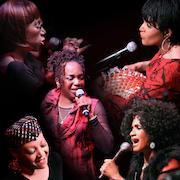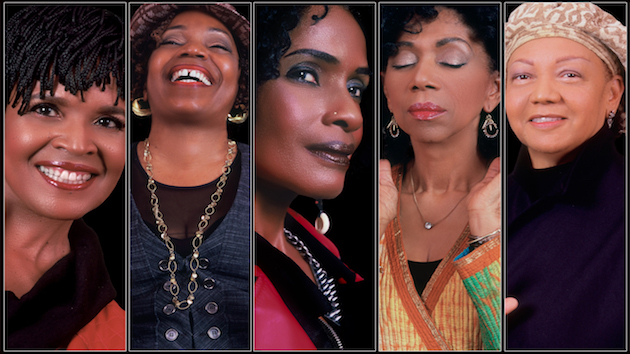
Everybody — even musicians — needs occasionally to be reminded of the volume and power of the human voice.
Especially now, after rolling through the screech of an incomparable presidential campaign that had everyone on both sides of the partisan divide feeling unheard. Especially upon reaching the end of a year in which guns, bombs, and people consumed by hatred seemed to fill the air with mechanical and aural explosions on a near-daily basis. Especially when stage productions gain baubles like fleas on a dog and every show is a cacophony of lights, sound, remote controlled electronics, action, and more action.
We need a silent night to prove that the degree of loudness isn’t the best measure of a sound’s impact. We need voices that sing Silent Night with the power of angels and carry us into a place where goodness, grace, and generosity abound. We need to be reminded that in us and in our neighbors, a unique voice resides and is special.
We need Sweet Honey in the Rock.
Arriving on a wing of gospel, spiritual, and multiethnic holiday season tunes, the five-member a cappella group sweeps into Davies Hall on Dec. 23 with their Celebrating the Holydays concert. The San Francisco Symphony plays host but will not be performing. Carol Maillard, Louise Robinson, Nitanju Bolade Casel, Aisha Kahlil, and American Sign Language interpreter Shirley Childress appear with featured musician Romeir Mendez on upright acoustic bass and electric bass. They will also perform at the Green Music Center in Rohnert Park on December 22.
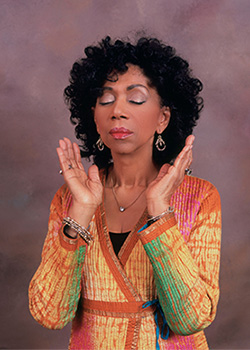
“We’ve been touring this show for the past seven or eight years,” says Maillard, in a phone interview. “I think there are 27 different celebrations that happen this time of year. We try to address the major ones in songs.”
Themes of good over evil, light after darkness, birth, awakenings, and the advent of good will, kindness, and giving are emphasized in songs that rise from various traditional holidays: Dwali (Hindu), Hanukkah (Jewish), Christmas (Christian), Kwanza (African), the Winter Solstice (secular) and more. “It’s a good time for introspection and retrospection about where we’re going as a country. The stories are of survival, perseverance, having hope, and moving forward — it’s all the same vibe,” says Maillard.
Mixed in with a recent arrangement of Silent Night and the other songs will be a few standards from the 43-year-old group’s extensive — voluminous — repertoire. Sweet Honey has an all-genres-embracing mission to educate and entertain with spirituals, blues, folk, gospel, jazz, popular, and world music. The balletic artistry of Childress, a standard feature at Sweet Honey concerts, provides that, through American Sign Language interpretation for the deaf and hearing impaired, no one is left behind.
But the group’s vision also includes protest and advocacy that addresses freedom, racism, sexism, systemic prejudice, social justice, and civil rights. Rooted in African-American traditions that reverberate with multigenerational respect and global perspectives, Sweet Honey is in some ways like a grownup child who never loses a sense of wonder about what could be — even while voicing frank, speak-my-mind assessments about present, dark realities.
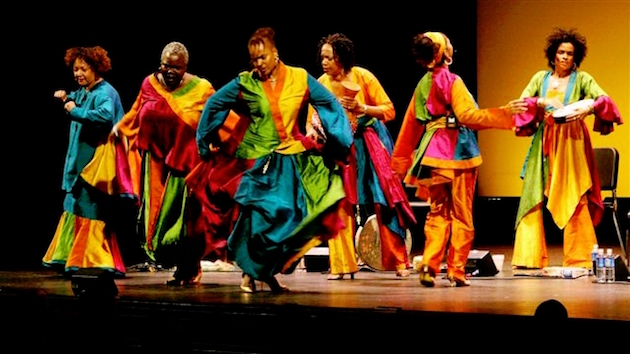
Maillard isn’t afraid to speak honestly about the election’s aftermath: “Now, people think they can call people horrifying names. That’s some dumb [expletive].” Love, she says, is an action word, something you go out and do. “You raise your voice, live, laugh, learn. You let love lead you. Love for your country, love for righteousness. The good people don’t speak up loud enough. It’s a wake-up call. Who gets heard? People with money. White men with money. Now everyone knows how the black, LGBT, poor, and other people have felt.”
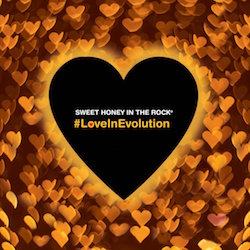 Which means that introducing selections from their impressive, immensely moving new CD, #LoveInEvolution, will add dimension to the program. The album’s beautifully mastered 14 tracks color Sweet Honey’s familiar sound with hip-hop, jazz, R&B, and folk music inflections while the lyrics tell historical and contemporary stories.
Which means that introducing selections from their impressive, immensely moving new CD, #LoveInEvolution, will add dimension to the program. The album’s beautifully mastered 14 tracks color Sweet Honey’s familiar sound with hip-hop, jazz, R&B, and folk music inflections while the lyrics tell historical and contemporary stories.
Maillard, who grew up immersed in music but with her mind focused on theater, says the collaborative writing process used for some of the songs on the CD was a step in a new direction. “We usually write separately. This one, we talked, had singing sessions that were improvisations. We made recordings of studio work, then learned the songs from the recordings. We’d write a verse for part of it, then we’d go back and listen to come up with a hook.”
“Second Line Blues” was written this way. A snare drum lays a beat while a roll call of names — Trayvon Martin, Sandra Bland, and too many more — unspools in an artful condemnation of gun proliferation and police violence. “Louise [Robinson] was thinking of how we’re having such a rash of murders of black men and women. People who were gunned down for no reason. She was thinking of the second line funeral procession in New Orleans: the slow part. That moan and slow drum beat, all the pieces — calling the names. Saddest thing? We couldn’t get all of them in.”
Sweet Honey recently performed the song at Carnegie Hall. Jazz Trumpeter Terence Blanchard accompanied them. “He started from the back of the hall. Played the whole song while the names rang out. It’s so sad, but it’s what’s happening,” she says.
The new album divides itself into contrasting songs that spin love that vibrates with funky base lines and bluesy soul (“Same Ol’, Same Ol’ Love”) or rattles with hope (“IDK, But I’m LOL!”). Another song slides between gospel and R&B, then segues into ,hip-hop with a smooth bass line that keeps the beat (“A Prayer for the World: Song 23”).
There is lamentation over loss and righteous outrage. Humanity, the earth, and other sacrificed-for-progress resources are heralded in “Mercy, Mercy Me (The Ecology),” a marvelous arrangement of Marvin Gaye’s 1971 classic tune. Overlaid are lyrics that call out bell-like single words like “world,” and phrases including “grace it, never replace it.” The group joins to sing the familiar tune in the last section, ending with the inserted question, “Where did all those blue skies go?”
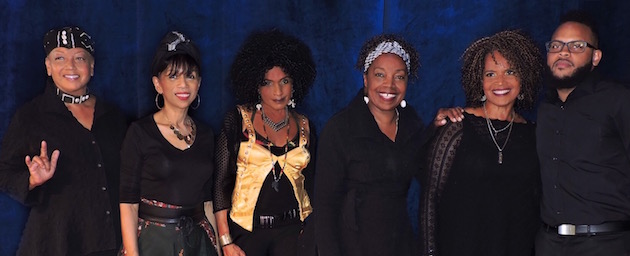
Maillard says that sometimes, a melody or lyrics don’t leave you. “This Place Inside Where I Can Rest,” a Latin-groove, jazz-infused track, accompanies a poem she wrote 10 years ago. Spoken word, poetry, and the personal stories that fed hip-hop during its origins are also Sweet Honey’s tools, but she mourns the misogyny, cursing, and degrading sexual direction the contemporary art form has adopted. “Sound can be used in many ways, and I’m sorry that more uplifting music isn’t reaching young people,” she says.
Perhaps in San Francisco, it will. Surely, there’s a girl or boy begging for the 21st-century equivalent of the transistor radio that was given to Maillard when she was 9 years old. “I got it, then I got my own turntable. I got records — Motown, R&B, not even the Beatles yet. We’d collect bottles and get our 10 cents and call the radio stations on pay phones. We’d get songs dedicated.” Maillard and her friends would dance in the hallways, put together singing groups and perform theatrical productions on the front porch. “It just started to evolve,” she says. Decades later, the process continues.
Correction: The first published version of this story mispelled the interviewee's surname. She is Carol Maillard, Malliard.

